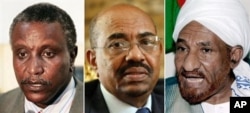With one month to go before Sudan elects its president and parliament, various opposition and civil society groups have met mixed results in organizing voter education campaigns across the country in 2010. They are urging a lifting of campaign restrictions imposed by Sudan’s National Election Commission (NEC) to limit political parties and citizens' rights to hold public rallies.
Last week, three members of the group Girifna were arrested as police and state security quashed a peaceful protest at a bus stop in central Khartoum. Executive director Osman Hummaida of the U.K.-based African Centre for Justice and Peace Studies says the arrests flout the 2005 interim constitution and bill of rights, and are one of several examples of the suppression by Sudanese authorities of efforts to oppose a regime which has ruled the country since 1989.
“It’s not just the arrests. There are many other kinds of restriction activities taken by the authorities and by the NEC against the opposition. One of these examples is when the national radio refused last week to air the speech by the presidency candidate Sadiq al-Mahdi, the former prime minister and the last elected prime minister. The objection was that there were 19 points of a 20-minute speech (that were) unacceptable. And when I looked at the 19 points as a fact – one of them is that President Bashir had been indicted by the International Criminal Court – they said they wouldn’t air that unless he censored his own speech, which is omitting 19 points out of 20 made. Then he has to shut up, unless he says something along the line of the ruling party,” Hummaida objected.
Former Prime Minister al-Mahdi, who was ousted by President Omar Hassan al-Bashir in a bloodless 1989 military coup, is contesting this year’s 11 April election as a candidate for the Umma party, which he founded in 1986.
Sudan’s opposition groups have complained that the National Election Commission is biased in favor of the Bashir government and is writing circulars and campaign regulations that favor the ruling National Congress Party (NCP) in the vote. Hummaida says that the crackdown on political activity severely limits the ability of civil society groups to engage the public to debate important issues and undercuts the holding of free and fair elections.
“I think that there is serious concern that there is unlikely to be a fair and free election in the month to come because obviously, none of the independent voices have been given the chance to express their will in the campaign,” he noted.
Sudan’s elections for president and the national assembly, the first vote in 14 years, have been postponed several times. They had been scheduled for March and April of last year, but delays in a credible national census postponed the voting, first until February of 2010, and then, to this April.
The vote will end five years of interim rule that spanned the 2005 conclusion of a 22-year-long civil war between the official government in the north and the semi-autonomous region of southern Sudan. Next year, south Sudanese voters will hold an independence referendum under terms of the 2005 Comprehensive Peace Agreement (CPA) to determine whether they will form their own state and secede from the north. Osman Hummaida says because they are aware of the importance of the 2011 vote, authorities in Khartoum are keeping a close eye on the perceptions of Sudanese voters regarding the conduct of this year’s election.
“I think the government will genuinely want to consider the general kind of thinking and will of its own people. It implies definitely the government, (and the National Congress Party, actually,) is ready to accept that kind of reality, that is, now it is time to deliver, to allow the real, genuine will of the people,” he said.
Hummaida agrees that the need to clear the way the 2011 referendum for southern Sudan to take place under terms of 2005 CPA has been a guiding force for the Khartoum government to permit the 11-13 April general elections to be held next month as planned.






![Southern Sudan leader Salva Kiir [R-front] and Sudan's 2nd Vice President Ali Osman Taha [L-front] attend the 14th Extra Ordinary Summit of the Inter-Governmental Authority Heads of State and Government at the Kenyatta International Conference Centre in N](https://gdb.voanews.com/46633337-1BE2-42ED-8589-80DF6C281955_w250_r0_s.jpg)









